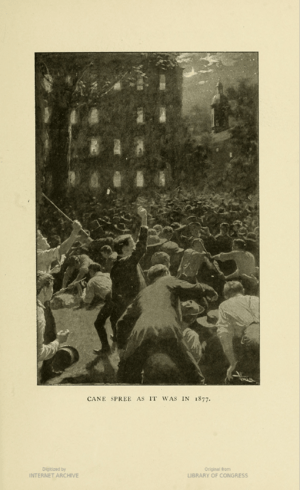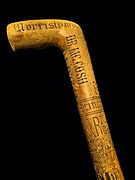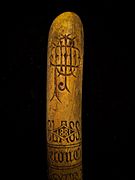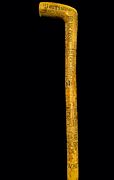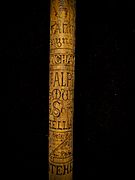Cane Spree facts for kids
Cane Spree is a fun yearly tradition at Princeton University. It started way back in the 1860s, a time called the Gilded Age (right after the Civil War). At first, it was a bit wild, with students from different years (called classes) fighting. Over time, it changed from a riot to a friendly competition. Now, it's a regular sports event where students from different classes compete in many games. This cool tradition still happens today!
Contents
History of Cane Spree
In the 1860s, during the Gilded Age, many stylish gentlemen carried walking sticks, also known as canes. At Princeton College, older students (called sophomores) didn't like seeing younger students (called freshmen) with canes. They would sometimes bother freshmen who carried them.
How Cane Spree Started
What we now call Cane Spree began as a real fight on Nassau Street in Princeton, New Jersey. Sophomores would attack freshmen who were showing off their canes. They would even take the canes away!
Later, Cane Spree became a way for students to challenge each other. It was even called the "first intramural sport" at the college. In 1868, sophomores officially said that freshmen were not allowed to carry canes on campus. If a freshman was caught with a cane, sophomores might try to take it.
Rules and Changes
At the very beginning, Cane Spree didn't have many rules, except that biting was not allowed. One student, Harrington DeGoyler Green, said Cane Spree would "weld the class together." This meant it helped students from the same year become closer. This was important for building class spirit at Princeton. The 1868 Cane Spree even inspired a song called "Siege of Canes."
Around the 1870s, Princeton University leaders tried to make the event less violent. But students still had random fights. On September 15, 1870, James McCosh, who was the President of Princeton College, stopped a fight. He told the students to "Disperse, young men!"
By 1891, Cane Spree was officially stopped. However, the class rivalries continued in other ways. Between the 1880s and early 1900s, Cane Spree became an organized event. Big newspapers like the New York Times and Scribner's Magazine would even report on who won. Winning a cane was considered a great honor!
Today, Cane Spree is still a tradition, but it's much friendlier. It happens in Princeton's football stadium in early October. It's a fun multi-sport competition between the freshmen and sophomore classes.
Canes
The canes (walking sticks) that students carried were special. Students would carve and decorate them themselves. They would etch their autograph or a special design onto the cane. Many of these carvings showed what job or area of study the student planned to have. Canes were passed around so each student could add their name. Then, they were returned to their owner.
- Hand-carved walking stick from Princeton College class of 1881 student
Notable Names on Canes
Some of the names carved on the Princeton College class of 1881 cane (shown above) belonged to people from important families of the Gilded Age. Some of them even became famous historical figures later on.
- Dr. Atwater
- A. C. Armstrong
- James R. Archer
- Adam Todd Bruce
- Charles Henry Butler
- Benjamin B. Blydenburgh
- Thomas W. Cauldwell
- Edward Floyd Crosby
- Henry G. Duffield
- Charles E. Dunn
- T. H. Powers Farr
- Jack Fowler
- Frank Gledhill
- David Adams Haynes
- William (Billy) Ingham
- Francis G. Landon
- Francis Loney
- Henry McAlpin
- Dr. James McCosh
- Samuel H. Myers
- Henry M. Payne
- John Oliver Halsted Pitney
- Charlie Ryle (Charles Danforth)
- Arthur A. Scribner
- Robert Rogers Shellabarger
- Lewis H. Stanton
- Paul VanDyke
- James Augustus Webb, Jr.
- A. Pennington (Penn) Whitehead
Images for kids
 | Misty Copeland |
 | Raven Wilkinson |
 | Debra Austin |
 | Aesha Ash |


